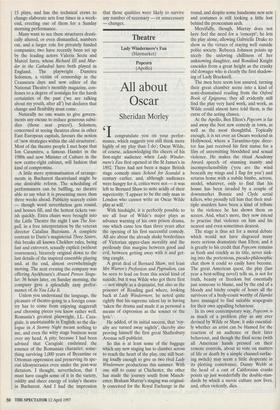Theatre
Lady Windermere's Fan (Haymarket) Popcorn (Apollo)
All about Oscar
Sheridan Morley
Icongratulate you on your perfor- mance, which suggests you still think more highly of my play than I do'; Oscar Wilde, of course, acknowledging the cheers of his first-night audience when Lady Winder- mere's Fan first opened at the St James's in 1892. There had not been a major British stage comedy since School for Scandal a century earlier, and, although audiences were hungry for it, critics were not — it was left to Bernard Shaw to note acidly of their superiority: 'I appear to be the only man in London who cannot write an Oscar Wilde play at will.'
With hindsight, it is perfectly possible to see all four of Wilde's major plays as advance warning of his own prison drama, one which came less than three years after the opening of his first successful comedy. All are about the already shaky borderlines of Victorian upper-class morality and the perilously thin margins between good and evil, between getting away with it and get- ting caught.
A great deal of Bernard Shaw, not least Mrs Warren's Profession and Pygmalion, can be seen to lead on from this social kind of suicide, but it was Wilde who got there first — not simply as a dramatist, but also as the prisoner of Reading gaol where, looking back at Lady Windermere, he noted quite rightly that his supreme talent lay in having 'taken the drama and made it as personal a means of expression as the sonnet or the lyric'.
He added, of its initial success, that 'roy- alty are turned away nightly', thereby also proving himself the first great Shaftesbury Avenue self-publicist.
So this is at least some of the baggage which any new staging has to clamber across to reach the heart of the play, one still beat- ing loudly enough to give us two rival Lady Windermere productions this summer. With one still to come at Chichester, the other has made the journey south from Manch- ester; Braham Murray's staging was original- ly conceived for the Royal Exchange in the round, and despite some handsome new sets and costumes is still looking a little lost behind the proscenium arch.
Mercifully, though, Murray does not here feel the need for a 'concept'; he lets the play alone, allowing Gabrielle Drake to show us the virtues of staying well outside polite society. Rebecca Johnson points up nicely the unloving chilliness of her unknowing daughter, and Rosalind Knight cascades from a great height as the cranky old dowager who is clearly the first shadow- ing of Lady Bracknell.
The men here seem less assured, turning their great chamber scene into a kind of semi-dramatised reading from the Oxford Book of Epigrams; they all evidently still find the play very hard work, and work, as Wilde could almost have told them, is the curse of the acting classes.
At the Apollo, Ben Elton's Popcorn is far and away the best new comedy in town, as well as the most thoughtful. Topically enough, it is set over an Oscars weekend in Hollywood, where a Tarantino-type direc- tor has just received his first statue for a film of unremitting bloodshed and sexual violence. He makes the ritual Academy Award speech of stunning inanity and incomprehensibility ('you are the wind beneath my wings and I flap for you') and returns home with a nubile bimbo, actress, model, whatever, only to find that his house has been invaded by a couple of downmarket Bonnie and Clyde serial killers, who proudly tell him that their mul- tiple murders have been a kind of tribute to the violence he has shown them on screen. And, what's more, they now intend to practise that violence on him and his nearest and even sometimes dearest.
The stage is thus set for a moral debate which would not have disgraced many more serious dramatists than Elton; and it is greatly to his credit that Popcorn remains as fresh and crackly as its title, never sink- ing into the portentous, pseudo-philosophic chat show it could so easily have become. The great American quest, the play (last year a best-selling novel) tells us, is not for truth, beauty or freedom but essentially just someone to blame, and by the end of a bloody and bitchy couple of hours all the survivors of a body-count worthy of Hamlet have managed to find suitable scapegoats for their own appalling behaviour.
In its own contemporary way, Popcorn is as much of a problem play as any ever devised by Wilde or Shaw; it asks essential- ly whether an artist can be blamed for the reaction of an audience or their later behaviour, and though the final scene (with all American hands pressed on their remote controls, about to vote on matters of life or death by a simple channel-surfac- ing switch) may seem a little desperate in its plotting contrivance, Danny Webb at the head of a cast of Californian cranks points up just wonderfully the double-stan- dards by which a movie culture now lives, and, often violently, dies.


































































 Previous page
Previous page